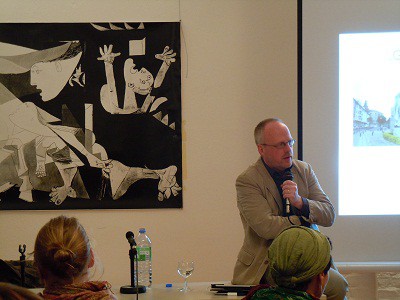basque heritage worldwide

09/11/2013

ADVERTISING
Frankfurt, Germany. In 1960 German Klaus Niebel, then 23 years of age, went to the Basque Country for the first time to work in an arms factory, Astra de Gernika. At that time he didn’t know anything about the bombing of the town by the Condor Legion, nor about the Basque language. When he returned to Germany, a year later, he had discovered another reality that was little known by the Germans that used to travel to Spain at the time.
From Cologne he kept in touch with friends in the Basque Country especially with deceased member of the Basque Language Academy Jose Antonio Arana Martija, with who he exchanged all kinds of information about Basque culture and history. For this work, Niebel was awarded the Argizaiola prize in 2000, at the Durango Basque Book Fair.
Inspired by Humboldt
“Guillermo von Humboldt, the German who discovered Euskal Herria (the Basque Country) for Europeans in 1801, greatly inspired our father, explains his oldest son, Ingo Niebel. “That is why he devoted himself to find out all kinds of information about Euskal Herria.”
The material is so abundant that the family Niebel decided to make it accessible to more interested people, donating it to the Basque Library in Frankfurt, making it the largest resource on Basque culture in Germany.
“We hope that his books will soon appear in the university catalogue so that they are part of the library and interlibrary loan system. Then one of our father’s biggest wishes will be fulfilled, that gaps in what the Basques are today and yesterday will be filled,” his son says.
Hundreds of Magazines and Books
The donation was made in July, according to Mikel Babiano. Among the hundreds of books and magazines on linguistics, philology and Basque literature, they found a collection of the magazine Euskera, Revista International de Estudios Vascos (RIEV) and the newsletter of the Society of Friends of the Basque Country, as well as books like the history of the Academy of the Basque Language Euskaltzaindia, diferent types of argizaiolas (carved wooden boxes) and a large number of periodicals.
Among these there are various issues of Euzkadi and Punto y Hora de Euskal Herria as well as publication that date from the Franco era like Vizcaya and Vida vasca.
The donated material also includes various archives of newspaper clippings, in Spanish and in Basque that reflect the political conflict from the end of Franco’s regime to the beginning of the 80s.
ADVERTISING
ADVERTISING
ADVERTISING
ADVERTISING
ADVERTISING
© 2014 - 2019 Basque Heritage Elkartea
Bera Bera 73
20009 Donostia / San Sebastián
Tel: (+34) 943 316170
Email: info@euskalkultura.eus